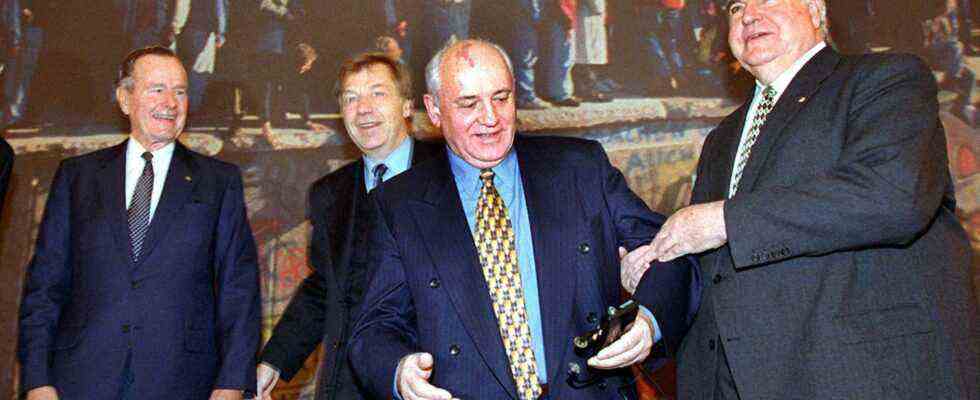conflict with Russia
There was never a promise that NATO would refrain from eastward enlargement
Helmut Kohl, Michael Gorbachev (from left) and George Bush (right) with the then Mayor of Berlin, Eberhard Diepgen, at the celebration of the tenth anniversary of the fall of the Berlin Wall.
© Andreas Altwein / Picture Alliance
Russia feels threatened by the West and repeatedly refers to a promise made in 1990 that there should be no eastward expansion of NATO. However, no such promise has ever been made.
“Today and in the future, no nuclear weapons and no NATO troops may be stationed in these countries. This must not only be promised, but must be recorded in a binding document.” This sentence from the mouth of a Russian defense minister could be from last week, but it comes from February 1997. The short-term military chief Igor Rodionov said it in an interview with the star.
Then as now, Russia felt threatened by NATO, or as Rodionov put it at the time: the military-strategic balance in Europe had been disturbed. The reason for his concern was the announced accession of the former Warsaw Pact states of Poland, the Czech Republic and Hungary to the western military alliance. Since then, Moscow has consistently complained that an eastward expansion of NATO had been ruled out in the course of the negotiations on German reunification. Alone: It’s not true.
It has been clear since 2014 at the latest that the West has never made a commitment not to expand NATO. It was none other than former Soviet head of state and party leader Michael Gorbachev who dispelled the myth of “breach of word” in the ZDF “Heute Journal”. After the fall of the Wall, he conducted the negotiations for the Soviet Union, and therefore also had a personal interest in his version of history being correct. Because otherwise it would mean that he would have been ripped off by the arch-enemy USA at the time.
Which was actually discussed in 1990
But Gorbachev’s argument is as simple as it is plausible: At the time, NATO’s eastward expansion was only a theoretical exercise, since the Warsaw Pact was still in place. And the Baltic states, which joined the alliance in 2004, were still part of the Soviet Union. What exactly happened in the negotiations on German reunification, called the 2+4 treaty, is now well documented, because the archives of some of the governments involved (George Bush for the USA, Helmut Kohl for Germany) are accessible, as are the records by foreign ministers like Hans-Dietrich Genscher and Eduard Shevardnadze.
the US historian Mary E. Sarotte reviewed the history of the negotiations that began in February 1990. After that, US Secretary of State James Baker gave Gorbachev the impression that NATO troops could not be stationed beyond the borders of the (old) Federal Republic (“not extended eastwards”, as his notes put it), but this idea was quickly recaptured by then US President Bush. Chancellor Helmut Kohl also assured the Soviet leader that he would not station any troops in East Germany, but later withdrew his promise. Accordingly, there are no documents or other binding writings that would rule out an eastward expansion of NATO.
Moscow had the power, the West had the money
The balance of power had shifted noticeably in the course of the 2+4 negotiations: it was up to Moscow to give the green light for reunification, but the West had won the competition between systems – and the money to give the Soviets out of their financial mess help. As the treaties began to take shape over the course of the year, Gorbachev even briefly floated the idea of a NATO-led European security system.
In 2004, when the first former allies of the Soviet Union became part of NATO, Russian President Vladimir Putin announced that each country should choose the alliance it sees fit. Nothing more is heard of this in Moscow. The fact that Russia continues to simmer the myth of the “broken commitments of the West” is primarily an excuse for its own expansionist claims. Various statements by Gorbachev and Putin make it clear what is behind this Russian agenda. Until the mid-2000s, the leadership in Moscow had hoped that, as a former great power, they would become an equal partner of the West.
Instead, more and more former sister states and Soviet republics are turning to the West, which has declared itself “the winner of the Cold War,” as Gorbachev said about eight years ago on ZDF: “The politicians in the West have gotten euphoria and triumphalism to their heads. They to have of Russia Exploited weakness and monopolized leadership in the world.”
Sources: DPA, “Today Journal” via “FAZ”, Mary E. Sarotte, “Southgerman newspaper“


